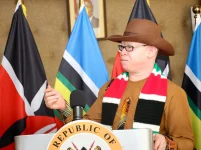Government Assures Continued HIV Treatment Despite U.S. Funding Halt.
The Kenyan government has pledged to maintain the supply of HIV medication for patients in the country. This comes after U.S. President Donald Trump decided to pause funding for global anti-HIV programs.
Trump's decision put the treatment of 40 million people worldwide at risk. This includes over 1.3 million Kenyans living with HIV.
State spokesperson Isaac Mwaura said the government is looking for other funding sources. He wants to make sure HIV patients in Kenya can continue their treatment without disruption.
"We are committed to your well-being," Mwaura said in a statement. "We are working hard to find local resources and new partnerships. We will do everything we can to support you during this difficult time."
HIV remains a major cause of death around the world. In 2023, 39.9 million people globally were living with HIV. About a third of them live in Sub-Saharan Africa.
The World Health Organisation (WHO) is worried about Trump's decision. They say it could limit access to HIV care in low and middle-income countries. This could make people with HIV sicker and more likely to die. It could also make it harder to prevent the spread of HIV.
Last year, Kenya marked 40 years since the first HIV case was reported in the country. The government launched a 10-year progress report. It showed that 1.378 million Kenyans have HIV. 97% of them are receiving treatment at 3,752 sites.
Health CS Deborah Barasa said Kenya has made great progress. But she warned against being too confident. She said the country must address ongoing inequalities to keep making gains.
Kenya aims to meet the UNAIDS 95-95-95 targets by 2025. This means getting 95% of people with HIV to know their status. Then 95% of those diagnosed to access treatment. And then getting 95% of those on treatment to have the virus under control.
Barasa thanked international partners like PEPFAR, the Global Fund, and UNAIDS. She said their help has been very important, but she emphasized the need for continued teamwork to achieve an AIDS-free future.
The Kenyan government has pledged to maintain the supply of HIV medication for patients in the country. This comes after U.S. President Donald Trump decided to pause funding for global anti-HIV programs.
Trump's decision put the treatment of 40 million people worldwide at risk. This includes over 1.3 million Kenyans living with HIV.
State spokesperson Isaac Mwaura said the government is looking for other funding sources. He wants to make sure HIV patients in Kenya can continue their treatment without disruption.
"We are committed to your well-being," Mwaura said in a statement. "We are working hard to find local resources and new partnerships. We will do everything we can to support you during this difficult time."
HIV remains a major cause of death around the world. In 2023, 39.9 million people globally were living with HIV. About a third of them live in Sub-Saharan Africa.
The World Health Organisation (WHO) is worried about Trump's decision. They say it could limit access to HIV care in low and middle-income countries. This could make people with HIV sicker and more likely to die. It could also make it harder to prevent the spread of HIV.
Last year, Kenya marked 40 years since the first HIV case was reported in the country. The government launched a 10-year progress report. It showed that 1.378 million Kenyans have HIV. 97% of them are receiving treatment at 3,752 sites.
Health CS Deborah Barasa said Kenya has made great progress. But she warned against being too confident. She said the country must address ongoing inequalities to keep making gains.
Kenya aims to meet the UNAIDS 95-95-95 targets by 2025. This means getting 95% of people with HIV to know their status. Then 95% of those diagnosed to access treatment. And then getting 95% of those on treatment to have the virus under control.
Barasa thanked international partners like PEPFAR, the Global Fund, and UNAIDS. She said their help has been very important, but she emphasized the need for continued teamwork to achieve an AIDS-free future.












